China Celebs
Barbie Hsu, Wang Xiaofei, and the Mattress Incident: Weibo’s Divorce Drama of the Year
The post-divorce fight between Wang Xiaofei and ‘Big S’ Barbie Hsu is taking place online, like a serialized drama going on for too long.
Published
3 years agoon

It’s the messy divorce drama that just keeps going: Taiwanese actress Barbie Hsu (‘Big S’) and mainland Chinese businessman Wang Xiaofei got divorced last year and recently aired their dirty laundry on social media. Even the expensive mattress the couple once shared suddenly became the focus of public attention.
One of the biggest celebrity topics on Weibo recently is the divorce drama between Taiwanese actress and tv host Barbie Hsu (Xu Xiyuan 徐熙媛, also known as Big S/大S) (45) and her former partner, Chinese mainland businessman Wang Xiaofei (汪小菲) (41).
In June of 2021, ‘Big S’ and Wang announced that they were in the process of divorce. The two were married for over a decade, since March 2011, and have two children together, an eight-year-old daughter and six-year-old son.
Less than a year later, in March of 2022, Barbie Hsu tied the knot with her former flame, South Korean musician DJ Koo Jun-Yup.
In November of this year, ‘Big S’ accused her ex-husband of failing to pay alimony since March of 2022. The accumulated amount reportedly had reached more than NT$5 million (US$160,000). The court ruled that some of Wang Xiaofei’s assets in Taiwan will be seized.
Wang Xiaofei then publicly responded to the accusations and aired the dirty laundry about the aftermath of the separation from Hsu.
Everyone and everything got involved afterward, from Wang’s mother to Barbie Hsu’s sister, and brother-in-law – the entire family got dragged into the drama.
The former couple’s old mattress even got dragged out for everyone to see. Meanwhile, Chinese netizens were eating popcorn and staying online to watch the divorce drama unfold.
Here is a timeline of what has happened.
▶︎▶︎ In the morning of November 21, Taiwanese media first reported that ‘Big S’ had accused Wang Xiaofei of not complying with their divorce agreement and had not paid alimony since March of 2022 and that Barbie Hsu had already taken legal steps to enforce the court order.
Via her lawyer, Barbie Hsu issued a statement about the matter, which went absolutely viral on Weibo. One post including the statement received over one million likes (#大S发声明稿#).
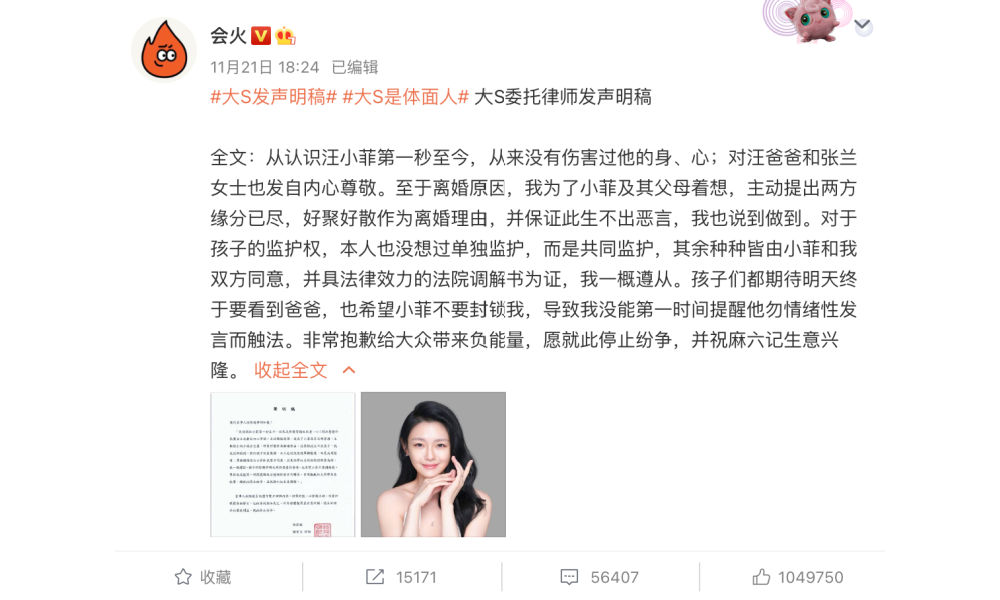
In the statement, dated November 21, ‘Big S’ expressed hopes that the dispute between her and her ex-husband could be solved as soon as possible for the sake of the children.
▶︎▶︎ Wang Xiaofei publicly responded to the issue in over twenty angry and emotional posts on his Weibo account (@汪小菲), where he has over seven million followers.
Wang, who is based in Beijing, complained about being smeared and not being able to see his children. According to Wang, he paid more than enough – millions – for child support and maintenance. He wrote he was unwilling to pay for an electricity bill that is not his after paying for the house where Barbie Hsu is living in and the custom-made mattress she is sleeping on, which allegedly cost him over US$320,160.
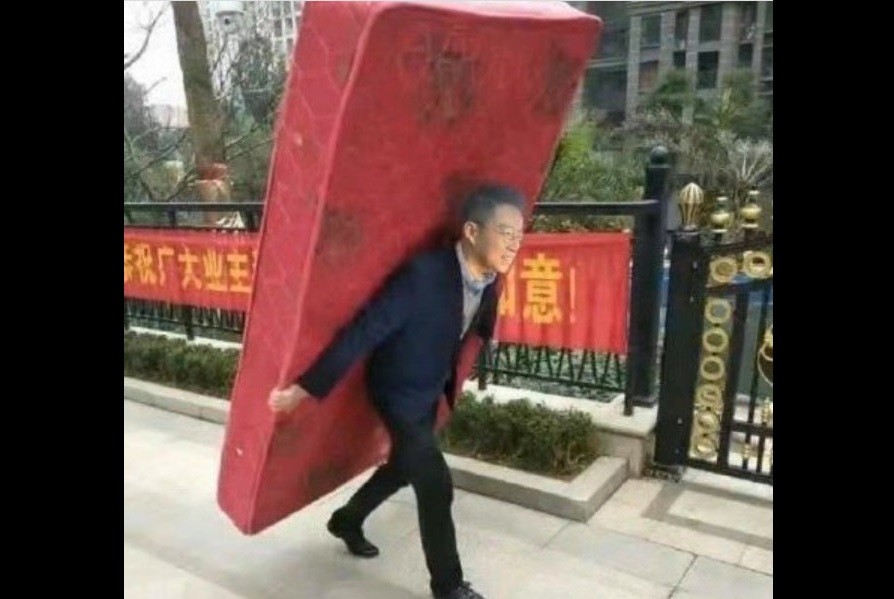
Photoshopped meme showing Wang carrying a mattress.
“Someone else is living there, fine,” he wrote: “Can you at least change the mattress, you wimp? Still letting me pay for the f*cking electricity bill.”
When Wang vowed to personally go back to Taiwan, some commenters reminded him not to forget to bring back his mattress.
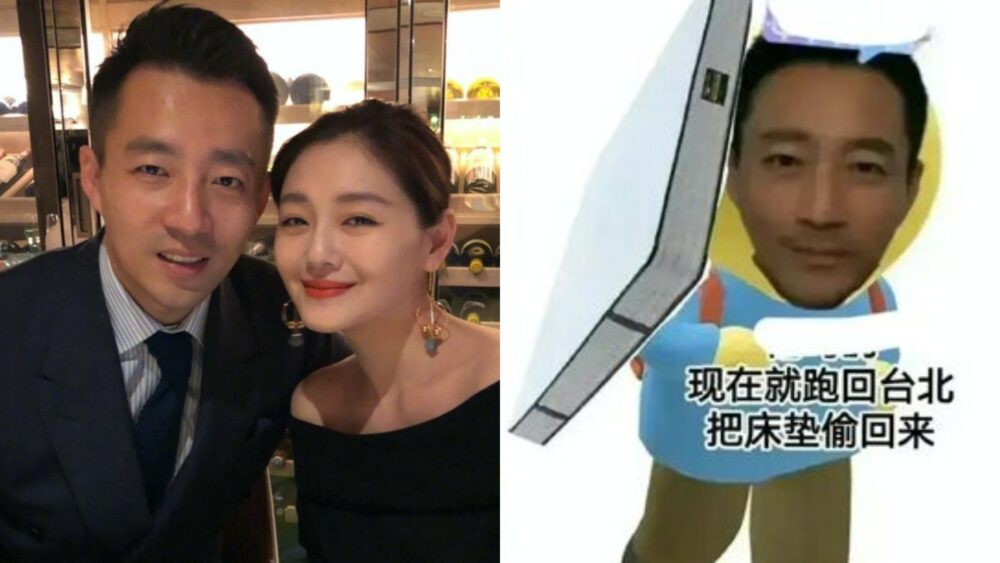
Meme on the right shows Wang Xiaofei with his mattress.
(It later turned out that Wang did not fly to Taiwan after all.)
▶︎▶︎ Wang Xiaofei claimed that Mike Hsu (Xu Yajun 许雅钧), husband of Barbie Hsu’s sister and Taiwanese tv host Dee Hsu (徐熙娣 aka ‘Little S’ 小S) has a mistress (#汪小菲发博曝许雅钧养小三#).
▶︎▶︎ Wang Xiaofei’s mother Zhang Lan (张兰) got involved in the drama and posted a lengthy statement on her own Weibo account on Tuesday, November 22.
Zhang Lan (@张兰俏江南创始人) is a billionaire business woman and the founder of the upscale restaurant chain South Beauty Group. She has her own livestream e-commerce channel.
Zhang accused her former daughter-in-law ‘Big S’ Barbie Hsu of hurting her son, not letting her see her grandchildren, while also caller her a liar and even suggesting she is a bad mother.
Zhang also accused her and her younger sister, Dee Hsu (徐熙娣), of having a history of drug abuse.
▶︎▶︎ On November 23, Barbie Hsu defended herself against drug abuse allegations in a social media post, stating both her and her sister suffer from bad hearts and are not even able to use drugs.
▶︎▶︎ The mother of Barbie Hsu and Dee Hsu also got involved, talking to the media and complaining that she has been scolded by Wang Xiaofei’s mother Zhang Lan, and saying that Wang and his mother are more than welcome to see the children; they would just need to come over in order to meet with them.
▶︎▶︎ November 23 became ‘Mattress D-day’ after it became known that Barbie Hsu had delivered the much talked-about mattress to the S Hotel in Taipei, which Wang owns (the hotel was named after ‘Big S’ in 2017). As reported by Taiwan News, the hotel’s general manager surnamed Lee (李) claimed the mattress arrived on Tuesday, and he stated that discarded mattresses are professionally destroyed.
On that Wednesday, the S Hotel held a press conference and allowed Taiwanese media to film and photograph the mattress being destroyed by workers.
The hashtag “Taiwan Media Live-Broadcasts the Handling of Wang Xiaofei & Big S Mattress” #台媒直播汪小菲大S床垫处理过程# went viral on 23 November, receiving over 270 million views on Weibo in one single day. A 23-minute video showed Big S’s mattress carried out of the hotel and being completely cut open by several men as a crowd of media stands by.
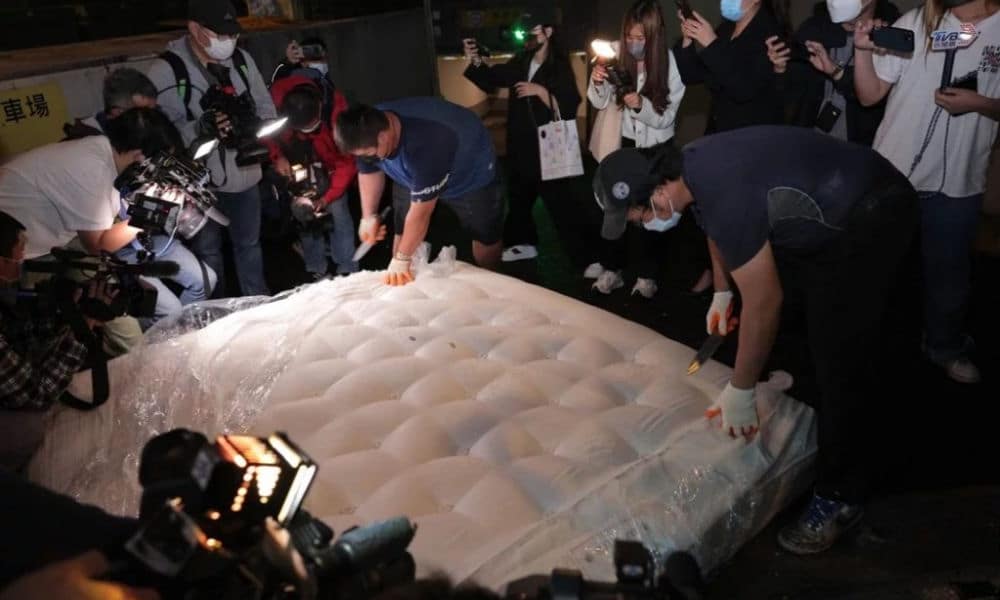
Some on Weibo said: “The drama is too much.”
▶︎▶︎ On Mattress Day, Wang posted again on social media, claiming that he had lost his temper after Hsu sued him for not paying alimony. As reported by Taiwan News, he wrote: “I don’t want to say anything anymore, burn the damn mattress, it’s all in the past, let’s not attack each other anymore.” The post was deleted soon after.
▶︎▶︎ With the mattress incident going viral, many netizens soon guessed that if it was about such an expensive mattress, it must have been one by the Swedish Hästens company.
Hästens (海丝腾) itself then responded to the drama via Weibo with an older video that showed its mattresses are of such good quality that they will never go up in flames.
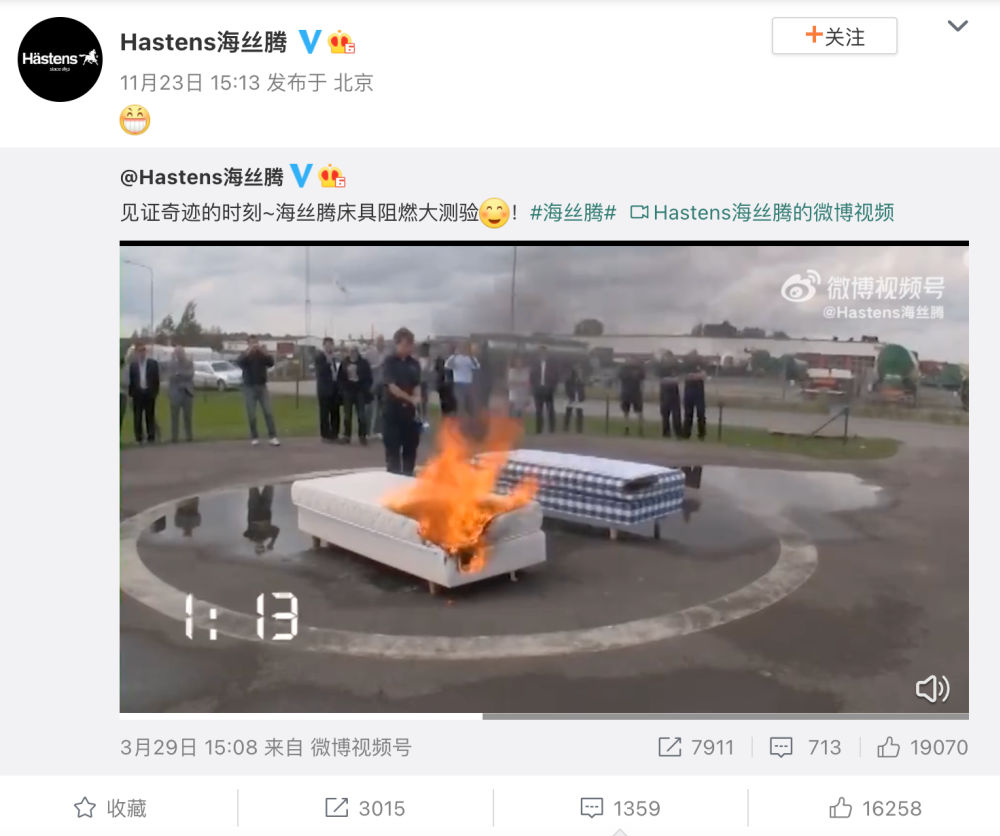
Hastens video comparing a different brand mattress to its own mattress; one will go up in flames, the other will not.
Hastens’ post received nearly 20,000 likes on Weibo.
▶︎▶︎ On Thursday, November 24, Wang Xiaofei’s mother Zhang Lan seized the opportunity to start selling mattresses on her livestream shopping channel (#张兰卖床垫#).
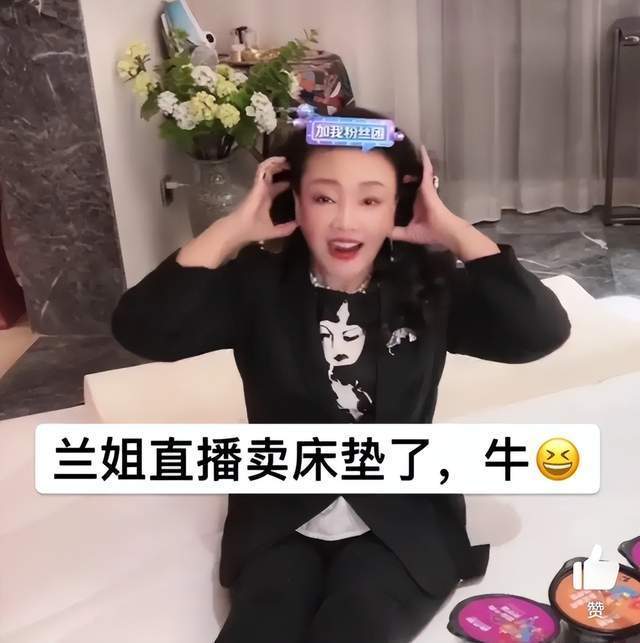
Besides all the personal drama, Zhang commercially profited from the current developments. According to recent reports, she did a total of nine live broadcasts from November 21 to 23, and saw 820,000 new followers flocking to her channel, with an average of 5.3 million viewers per livestream, and up to 25 million RMB ($3,5 million) in sales.
▶︎▶︎ On the same day, as reported by Singaporean Yahoo News, Wang Xiaofei declared that he wants to end the conflict with his wife, only to later delete the post from his Weibo account. Somewhere in all this, Wang also accused Big S of cheating on him since 2018.
He reportedly wrote: “I don’t want to say anything anymore. The mattress is burned. It’s over. We won’t hurt each other anymore.”
By that time, the drama was so big on social media that some netizens wrote: “I can’t wait for Wang Xiaofei to be gone from my timeline!”
▶︎▶︎ On November 25, Wang Xiaofei started a livestream while laying in his bed, offering viewers a look into his private bedroom. He seemed to be pleased about getting so many views and some suggested he seemed to be drunk. During this livestream, an unknown woman suddenly seemed to lay down beside him, making the livestream comments explode. The livestream stopped shortly after.
▶︎▶︎ Another character stepped on this stage. Chinese actress Gina Zhang (Zhang Yingying 张颖颖) went online to defend Wang (who may be her good friend or something more), saying he is on the verge of a mental breakdown. She also wrote that she hoped to convince him to stop sharing all of his struggles on public platforms for the entire world to see.
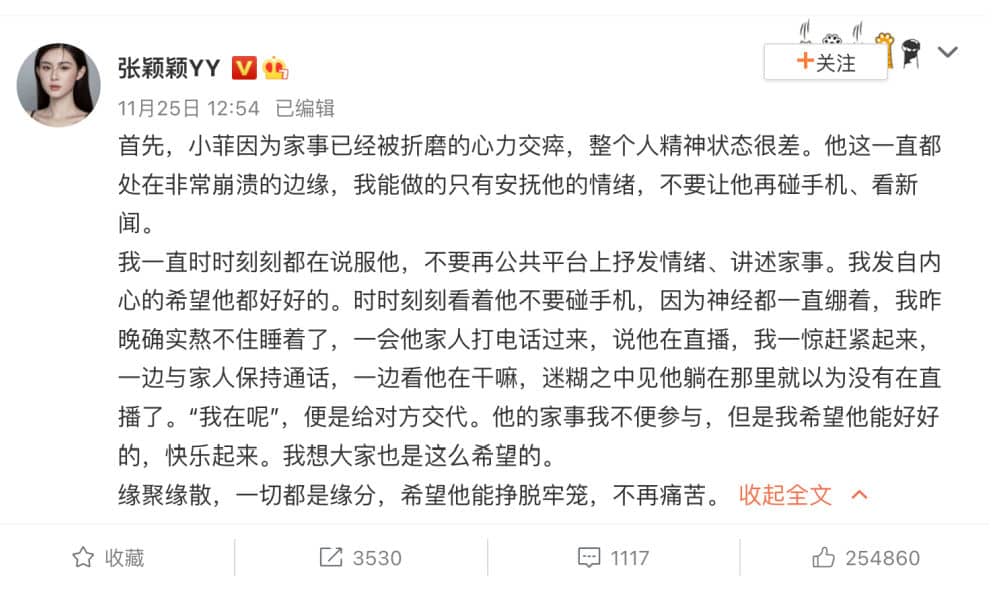
She also turned out to be the woman in the livestream. Over 250,000 people liked her post.
▶︎▶︎ Meanwhile, Barbie Hsu publicly posted bank account statements from 2016 to prove her financial independence and that she had paid for the downpayment of their house at the time herself.
▶︎▶︎ On December 3, again another hashtag related to this divorce drama came out, getting up to 200 million views in a day (#大S再婚头纱是刷汪小菲信用卡买的#).
The trend relates to the story of ‘Big S’ reportedly asking Wang to leave his credit card after the separation, and that the veil that she wore during the wedding with her second husband, among other things, was bought with Wang’s credit card.
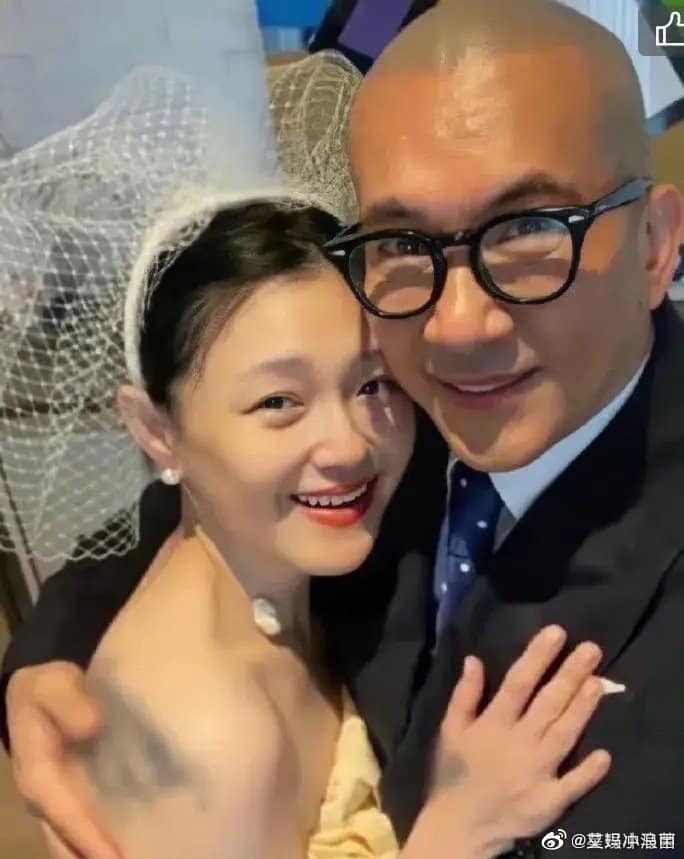
On the same day, Wang’s mother Zhang Lan again commented on the issue in one of her livestreams, saying that Wang and Barbie Hsu officially are not even divorced yet since their marriage was registered in Beijing and had not been dissolved yet (#张兰说大S和汪小菲还没有离婚#).
▶︎▶︎ On December 4, the hashtag “Wang Xiaofei or Big S – Who Is Telling Lies?” (#汪小菲大s谁在说谎#) went viral, getting an astonishing 560 million clicks on Sunday.
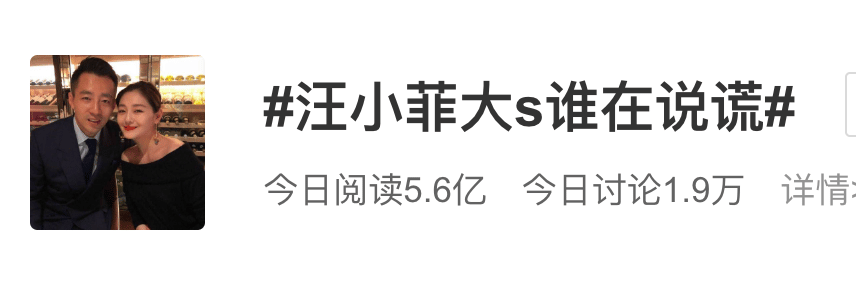
It is clear that two former have actually ruined their reputation by airing their dirty online like this. This especially matters for Big S, who used to do commercials for many brands.
“It’s like we’re watching a theater play,” some said.
Others are also tired of their drama dominating social media topics: “I don’t care which one is lying, I care about their kids.”
“This serialized drama is going on for too long now,” others wrote.
This is not the first big celebrity divorce drama to go viral on Weibo. In 2021, there was the big fall-out between Wang Leehom and Lee Jinglei. The separation between actor Wang Baoqiang and Ma Rong became one of the biggest trending topics on Weibo of all time.
Meanwhile, some netizens can’t seem to get enough of the drama: “From the mattress to the veil, I’m just enjoying the spectacle.”
By Manya Koetse
Get the story behind the hashtag. Subscribe to What’s on Weibo here to receive our newsletter and get access to our latest articles:
Spotted a mistake or want to add something? Please let us know in comments below or email us. First-time commenters, please be patient – we will have to manually approve your comment before it appears.
©2022 Whatsonweibo. All rights reserved. Do not reproduce our content without permission – you can contact us at info@whatsonweibo.com.
Manya is the founder and editor-in-chief of What's on Weibo, offering independent analysis of social trends, online media, and digital culture in China for over a decade. Subscribe to gain access to content, including the Weibo Watch newsletter, which provides deeper insights into the China trends that matter. More about Manya at manyakoetse.com or follow on X.

China Celebs
Beauty Influencer Du Meizhu Accused of Scamming Fan Out of $27K
Published
1 week agoon
June 27, 2025
🔥 Quick Take: Trending in China
This is a brief update from our curated roundup of what’s trending in China this week. A version of this story also appears in the Weibo Watch newsletter. Subscribe to stay in the loop.
Chinese beauty influencer and livestreamer Du Meizhu (都美竹) is facing online backlash this week after a former female fan filed a police report accusing her of scamming her out of nearly 200,000 yuan (approx. US$27,800).
The fan, known online as Sister Bing (Weibo handle @冰点人a冰点), has come forward with detailed allegations, claiming Du began swindling her in 2022.
Du Meizhu rose to national prominence in 2021 when she was 19 years old and became the first person to publicly accuse Chinese-Canadian pop star Kris Wu (吴亦凡) of rape and sexual misconduct. After at least 24 more victims also came forward, Wu was formally arrested on suspicion of rape in mid-August 2021 and was later sentenced to 13 years in prison.
It was around this time that ‘Sister Bing,’ whose real name is Ms. Zhu (朱, born 1979), started following Du Meizhu on social media. As a hard-working single mother of a daughter, she said she sympathized with Du and wanted to show her some support. In a Weibo post published in 2024, she detailed how Du Meizhu began noticing Zhu’s online interactions in early 2022 and added her as a friend on WeChat.
In private conversations, Du shared complaints about her difficult life, and as the two talked more and more, Zhu began transferring small amounts of money to help. Over time, Du said she needed money for various things—from financial support for school to legal disputes and expensive medical treatments for family members. Between 2022 and 2023, Zhu claims she transferred nearly 200,000 yuan in total.
At the end of 2023, Zhu–who works as a taxi driver–urgently needed money due to a family crisis. She reached out to Du to ask if she could repay the money. According to Zhu, she only returned 30,000 yuan (US$4,180) and refused to pay more, even though at the same time, Du was allegedly flaunting luxury brand purchases and had plans to buy a villa.
On June 25, 2025, Zhu posted an update on her Weibo account, saying she had traveled to Ulanhot City in Inner Mongolia – Du’s hometown – to seek justice and report the case to local authorities.
Du Meizhu has responded to the allegations on social media, writing that she “won’t admit to things I haven’t done.” She does not deny that Zhu gave her money.
She writes: “When she had money, she was lavishly spending it on gifts in all kinds of livestreams. Now that she’s broke, she wants it back from the streamers? After I transferred her thousands of yuan, she’s still not satisfied and is now starting to extort me. No amount of moral pressure will work. I have a clear conscience!”
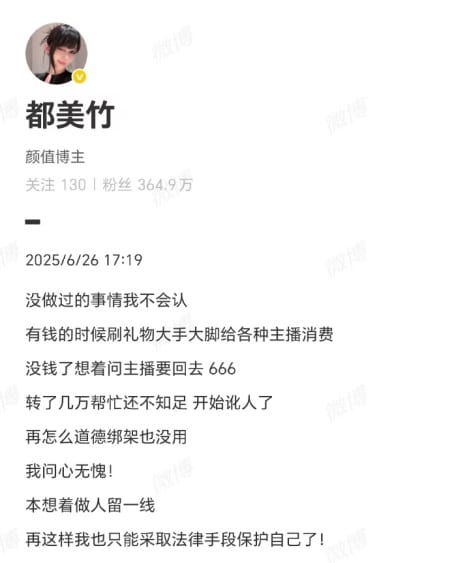
The post by Du Meizhu
The case has blown up online. One post by Ms. Zhu has already received over 133,000 likes and is still gaining traction.
But the developments surrounding the case are puzzling to some. Du Meizhu has long maintained a social media image of wealth, showcasing a lifestyle filled with Dubai travel, horseback riding, luxury food, and fashion. Why would she need to take money from a single mum? Du is being criticized not only for faking her wealth, but also for accepting so much money from a woman who clearly needed the money for her own family.

Du Meizhu social media photos.
Although the story is attracting a lot of attention online because it exposes private conversations between Du and the woman – and, frankly, many netizens just enjoy the drama, – it also says a lot about China’s thriving livestreaming industry and just how close online followers can feel to the influencers they follow. In these kinds of online communities, it is common for fans and followers to send livestreamers money or ‘virtual gifts’.
In the case of Ms. Zhu, some netizens doubt that she can prove in court that she loaned Du the money instead of gifting it to her. People also criticize Zhu: why did she spend so much money on an online influencer instead of on her own daughter?
Either way, many Chinese netizens feel that it was not right of Du Meizhu to take advantage of a single mum like that. Even if she’s not legally wrong, they feel she lacks moral integrity.
Du’s most recent social media post—featuring her in so-called “old money fashion” outfits—has only added fuel to the fire. Dozens of commenters flooded the post with demands that she repay Ms. Zhu. Though Du seemingly tried to delete the negative comments, they kept pouring in. “At this rate, there won’t be any comments left,” one user wrote.
Whether or not Du Meizhu ultimately faces legal consequences, the backlash is already taking a toll. She might escape the courtroom, but won’t be able to escape the court of public opinion.
By Manya Koetse
(follow on X, LinkedIn, or Instagram)
Spotted a mistake or want to add something? Please let us know in comments below or email us. First-time commenters, please be patient – we will have to manually approve your comment before it appears.
©2025 Whatsonweibo. All rights reserved. Do not reproduce our content without permission – you can contact us at info@whatsonweibo.com.
China Celebs
Earring Gate: Huang Yangdiantian and the 2.3 Million RMB Emerald Earrings
Online sleuths connect emerald earrings to post-earthquake business ties—sparking official investigations.
Published
1 month agoon
May 25, 2025By
Ruixin Zhang
Dear Reader,
This week, the Chinese internet exploded over a pair of earrings worn by a child actress.
In recent years, China’s netizens have been paying closer attention to so-called “nepo babies”—the children of the rich and powerful whose success often seems tied more to family connections than to talent.
Some, like Huawei’s heiress Yao Anna (姚安娜), have been criticized for using family ties to enter the entertainment industry. Others, like the infamous “Miss Dong” in the recent medical scandal, have sparked public outrage for abusing privilege to bend academic rules.
Facing economic difficulties and a tough job market, the public’s tolerance for nepotism and corruption is running increasingly thin. But when these issues touch on national trauma, including natural disasters and charity efforts, the public anger runs even deeper.
That’s why a Chinese teenage actress named Huang Yangdiantian (黄杨钿甜) recently found herself at the center of an online storm.
Earring Gate: Behind the Sparkle
Huang, born in 2007, started her career as a child actress in the 2017 historical drama Princess Agents (楚乔传).

She later gained more popularity by starring in other hit series, including Ruyi’s Royal Love in the Palace (如懿传), and also built an online following.
The recent scandal broke out after Huang shared a series of photos on Xiaohongshu, where she has around 328,000 followers. In the photos, meant to celebrate her 18th birthday, she’s seen proudly wearing a pair of sparkly emerald earrings. In the caption, she mentioned they belonged to her mom.
Sharp-eyed netizens quickly identified the earrings as a pair from the British luxury brand Graff—worth a jaw-dropping 2.3 million RMB (319,000 USD).

Digging deeper, online sleuths also found a Weibo post from 2018 showing Huang’s mother wearing a Cartier bracelet, which now retails for around 450,000 RMB (62,400 USD).
Considering Huang’s limited acting experience and modest earnings as a child actress, these luxury items raised eyebrows—and questions about where the family’s wealth was really coming from.
The “online detectives” didn’t stop there. They discovered that Huang’s father, Yang Wei (杨伟), was once a public official in Ya’an City (雅安市), Sichuan Province. After a major 7.0-magnitude earthquake struck Yan’an in 2013 (the Lushan Earthquake), Yang was reportedly involved in post-earthquake reconstruction projects, including investment and tendering.
Interestingly, in 2014, just a year after the earthquake, Huang’s family registered a film and culture company in Shenzhen with 5 million RMB (694,000 USD) in capital. Initially, the company’s legal representative was Huang’s uncle, followed by her mother in 2016. But after Yang resigned from public service, he took over as the official legal representative.
During the pandemic in 2020, Yang also registered a biotech company, which was later rebranded as a beauty and cosmetics trading business. The timing—one company during post-quake reconstruction, then another during a global health crisis—raised suspicions about whether Yang was using national emergencies as business opportunities.
It was also discovered that the Yang family currently lives in a luxury villa in one of Shenzhen’s most upscale neighborhoods, valued at over 100 million RMB (approximately 13.8 million USD).
How did Yang get enough money to start such companies and purchase a multi-million yuan villa? Even if all his official work and business ventures were legitimate, netizens pointed out it still wasn’t enough to explain the family’s enormous wealth.
Huang’s Father Responds, Netizens Dig Deeper
As the controversy grew, Huang’s father responded on May 16 via Weibo, using an account simply named “Huang Yang’s Dad” (黄杨爸爸).
In his post, he claimed that the emerald earrings were fake and of little value. He acknowledged having worked for the Yan’an government but denied any involvement in post-earthquake work, saying the online accusations against him were a case of mistaken identity—“just someone with the same name.” He even added, “I’ve never been corrupt—feel free to report me.”
But the “same name” defense didn’t hold up for long.
In a second wave of ‘detective work’ by online sleuths, netizens found a phone number listed under the name “Yang Wei” on a government website related to post-earthquake reconstruction projects in Ya’an. Some tried sending a small transfer to this number via Alipay, revealing that the profile picture linked to that account was a photo of Huang and her mother when she was younger, immediately making his “same name” explanation completely implausible.
Soon after, the account could no longer be found on Alipay, but because the number was likely tied to many services and platforms, it wasn’t easy to erase entirely. People quickly traced the same phone number to Yang’s accounts on other platforms. Around the same time, the legal representatives of the family’s companies were abruptly changed, only further fueling public suspicion.
Huang’s talent agency issued a statement calling the online rumors false but didn’t offer any concrete evidence to back that up.
By now, a local investigation by the Ya’an Discipline Inspection Commission has confirmed that Yang engaged in illegal business activities and that the birth of his second child (Huang’s younger brother) violated the one-child policy still in effect during his time as a government official. However, the investigation also denied any misappropriation of post-earthquake reconstruction funds. (link).
Most netizens find that many key questions are still left unanswered, and continue to investigate and dissect every single detail relating to Yang, Huang, and the earrings.
More than Online Gossip: Privilege & Public Grief
Some argue that the online speculation surrounding this case has now gone too far.
But for many Chinese netizens, especially younger ones, this isn’t just another scandal passively consumed by the so-called “melon-eating masses” (吃瓜群众). It strikes a nerve because it brings together several sensitive issues all at once.
Although China’s “nepotism babies” frequently spark backlash, they’re also everywhere, from business and entertainment to political and academic circles. For years, the fù èr dài (富二代), or “second-generation rich”—children of those who built fortunes after China’s economic reforms in 1978—have drawn criticism for flaunting wealth and behaving irresponsibly.
Through the years, new terms have been added to China’s nepotism lexicon: there’s xīng èr dài (星二代), referring to the children of celebrities; guān èr dài (官二代), a negative label for the children of government officials or bureaucrats; and hóng èr dài (红二代) and jūn èr dài (军二代), used to describe the children of political elites and military families.
Nepotism is closely tied to corruption—another painful issue in society that surfaces time and again. It’s particularly sensitive because it undermines more than just trust in (local) leadership; it erodes faith in meritocracy and leads the public to question the fairness of the entire system.
When these kinds of issues become entwined with national disasters and charity work—where the already privileged are seen to illegally profit from public grief for private gain—it becomes more than just a breach of public trust. It crosses a moral red line in the most extreme way.
For many young Chinese today, earthquake disasters are not distant history – they’re part of a shared collective memory that still strikes a nerve. In the comment sections of related news posts these days, many netizens recall donating money and supplies to earthquake relief efforts, now wondering whether their goodwill ever truly reached those in need.
The timing has only added fuel to the fire. The controversy erupted around the 17th anniversary of the devastating 2008 Wenchuan earthquake (5.12). Though that disaster is different from the 2013 earthquake, both struck Ya’an City, and public discussions has started to lump them together, bringing back old memories and concerns about disaster relief and public trust.
Back in 2009, Professor Deng Guosheng (邓国胜) from Tsinghua University studied where the 76.7 billion RMB (about 10.5 billion USD) in Wenchuan relief donations had gone. He found that nearly 80% of the money was controlled by the government or groups linked to it, like the Red Cross, with little transparency on how it was spent. People basically have no idea how the money they donated was spent.
In light of the recent controversy, Deng’s study and its numbers are being brought up again in many threads across Chinese social media. Today, as much as 15 years ago, the call for transparancy on how the public’s money is being used in the post-disaster time period is just as relevant.
One Weibo commenter wrote: “For context, in all of 2024, Ya’an City’s general public budget revenue was 8.4 billion RMB in total. This means that the total amount of donations and supplies after the 2008 earthquake was equivalent to 25 years of Ya’an’s current public budget revenue!” He later added: “It’s really not unreasonable at all for the public to ask questions about the authenticity of a pair of 2.3 million RMB earrings.”
Others agree: “It’s absolutely valid for everyone to focus on whether Huang Yangdiantian’s father was involved in embezzlement or bribery (..) When it comes to a tragic event like the Wenchuan earthquake, claims should especially be backed by solid evidence.”
The speculation about Huang’s family wealth goes well beyond celebrity gossip or a “nepo baby” narrative; it reflects a deeper call for clean governance and stricter oversight of how public and charitable funds are managed and spent.
As for Huang, the consequences of her glamorous photoshoot and the controversy it sparked are already unfolding. While her father has now become the target of further formal investigation by disciplinary authorities, it’s rumored that Huang has been removed as the female lead for the historical drama Peacock Bone (雀骨), as well as casting uncertainty over the viability of some of her upcoming projects.
At least we almost certainly know one thing: she won’t be wearing those earrings again any time soon.
Best,
Ruixin Zhang & Manya Koetse
Subscribe

A Very Short Guide to China’s Most Popular Designer Toys

The Next Labubu: What the Rise of Wakuku Tells Us About China’s Collectible Toy Wave

Jiehun Huazhai (结婚化债): Getting Married to Pay Off Debts

Yearnings, Dreamcore, and the Rise of AI Nostalgia in China

Beauty Influencer Du Meizhu Accused of Scamming Fan Out of $27K

China Is Not Censoring Its Social Media to Please the West

IShowSpeed in China: Streaming China’s Stories Well

Inside the Labubu Craze and the Globalization of Chinese Designer Toys

China Reacts: 3 Trending Hashtags Shaping the Tariff War Narrative

China Trending Week 15/16: Gu Ming Viral Collab, Maozi & Meigui Fallout, Datong Post-Engagement Rape Case

Chinese New Nickname for Trump Mixes Fairy Tales with Tariff War

Strange Encounter During IShowSpeed’s Chengdu Livestream

No Quiet Qingming: From High-Tech Tomb-Sweeping to IShowSpeed & the Seven China Streams

Understanding the Dr. Xiao Medical Scandal

From Trade Crisis to Patriotic Push: Chinese Online Reactions to Trump’s Tariffs
Get in touch
Would you like to become a contributor, or do you have any tips or suggestions? Get in touch here!
Popular Reads
-

 China Media12 months ago
China Media12 months agoA Triumph for “Comrade Trump”: Chinese Social Media Reactions to Trump Rally Shooting
-

 China Memes & Viral12 months ago
China Memes & Viral12 months agoThe “City bu City” (City不City) Meme Takes Chinese Internet by Storm
-

 China Society9 months ago
China Society9 months agoDeath of Chinese Female Motorcycle Influencer ‘Shigao ProMax’ Sparks Debate on Risky Rides for Online Attention
-

 China World11 months ago
China World11 months agoChina at Paris 2024 Olympics Trend File: Medals and Moments on Chinese Social Media




